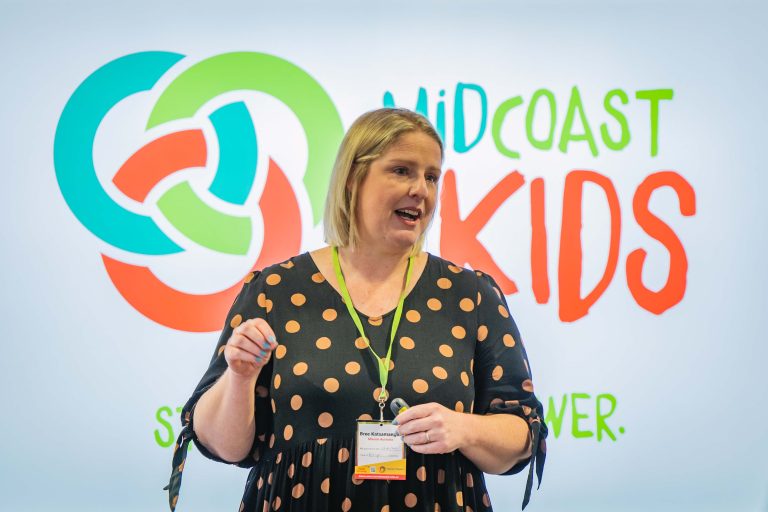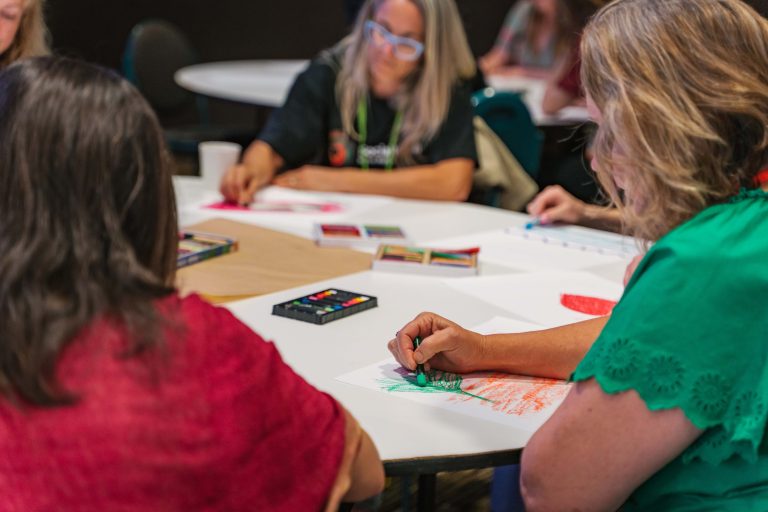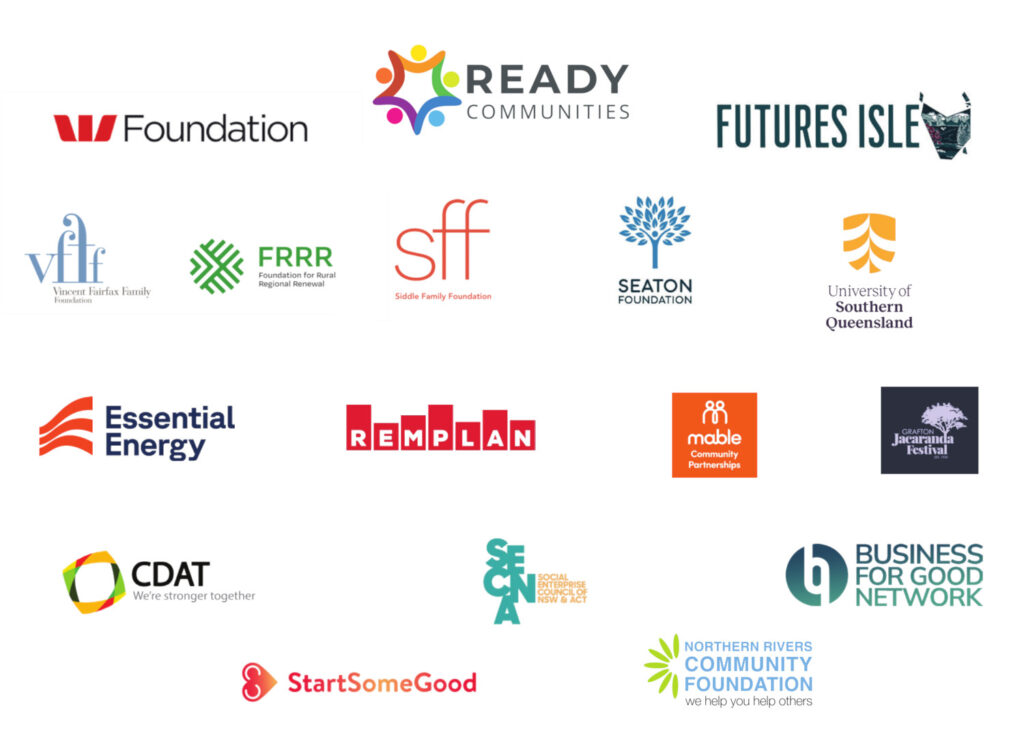#SIITR25 program
Who, where, what and when (2025)
Each of the three conference days incorporate a variety of opportunities to learn, connect and reflect on social impact in your own regional community. Our 2025 conference program is inspired by the Nirvana song “come as you are”. The program themes are listed below:
Day 1: Come as you are
Is your regional community ready for what’s next? Are you? Benchmark your individual and collective readiness through plenaries, workshops, and Impact Labs exploring the five Readiness Indicators; Clarity, Capacity, Connection, Collaboration, and Advocacy.
Day 2: As you were
Wellbeing in regional communities often takes a back seat. Today we explore it from every angle: personal, cultural, financial, and systemic, grounded in Connection and Collaboration.
Day 3: As you want to be
Time to turn insight into action. Build a practical plan using the Readiness Indicators to guide your next steps. Connect with allies, investors, and ideas that will carry you forward.
- 50+ Speakers
- Workshops
- Master Classes
- Pitchfest
- Social Events
Day 1 - Wednesday, 3rd September
Registration from 8am conference will commence at 9am sharp
08:45
Welcome to Country
Welcome
The Hon. Janelle Saffin MP, NSW Minister for Small Business, Recovery and the North Coast
Official opening
SIITR25 Advisory Team member, Jesse Taylor
09:40
Panel conversation: Place, Power and Possibility (Part 1)
The System's Story
FRRR CEO, Natalie Egleton will guide us through the first two panels which are designed to build context about where we are in the regions through the lens of place, power and possibility.
There’s a lot of talk about place – what does it mean in the current context and why have policy makers and funders turned their gaze in this direction?
Featuring:Our special guests spanning philanthropy, policy and economics include Margot Beach (GM of Dussledorp Foundation), Di Kapera, (State Director, NSW/ACT of Mission Australia), Kim Houghton (Economic Solutions) and special guest to be announced.
10:25
Panel Conversation: Place, Power and Possibility (Part 2)
The Community's Call
How is the notion of place impacting regional communities? What matters in the regions?
Featuring: Jo Kelly, (Partnership Lead of Learning the Macleay); Dr Leon Ankersmit (CEO of Caringa Australia Limited), Elly Bird (Executive Director, Resilient Lismore.)
11:10
Morning Tea - Time for a short break
11:40
Session: Demystifying the Impact Economy
Demystifying the Impact Economy with Elise Parups
With $7 trillion in funds under management in Australia—but less than 3% of GDP going to impact investing—how are we using our capital to drive real change? Join Elise Parups for a sprint to unpack everything from philanthropy to impact-aligned capital with commercial returns and everything in-between. Demystify the jargon, identify networks and powerful influencers that shift capital for good and unlock your enterprise’s potential. In this workshop, you will explore options to uncover what kind of capital your venture needs, and how to navigate the financial ecosystem it at the right stage, at the right phase, for the right impact.
12:25
Session: Pay What if Takes
Jo Taylor, Pay What it Takes
More info coming soon
12:40
Break for Lunch - experience a range of local produce and meet your SIITR25 community at this interactive lunch experience.
14:15
Impact labs
Hear from a range of host community (Grafton) practitioners and work through a facilitated process to explore real-life opportunities in the selected impact area.
Align this learning to your community.
Social Enterprise Ecosystem Development
What does it take to create a thriving social enterprise ecosystem in a regional community? How can we get support when we are the only social entrepreneur in the village? In this Lab we will explore social enterprise in the regional context and the importance of developing robust ecosystems to support people working in this space.
Social Enterprise Ecosystem Development
Workshop Facilitator: Tom Allen, Business for Good Network
Local Impact Facilitator: The Very Reverend Naomi Cooke.
Opportunity: How can we build connected social enterprise (and social impact) ecosystems when the support mechanisms don’t always exist in regional communities?
Naomi has identified a range of social enterprise opportunities at the Anglican Cathedral precinct in Grafton but where to begin? And who are her local allies? In this lab you’ll learn more about Naomi’s hopes for the precinct, challenges as a local social entrepreneur and explore ways to develop a thriving social impact ecosystem.
Main Street Activation
What does your community's main street have to do with the general health of the community? More than you think. In this lab explore what it takes to create a vibrant main street and why it matters.
Main Street Activation
Facilitator: Kerry Grace
Guest speaker: Ash Watt, Why Leave Town
Opportunity: How can we create thriving main streets and utilise them as a tool to strengthen local communities?
Main Street activation is often seen as an economic, rather than community development activity but whose role is it to ensure we have thriving main streets and why should we care? With main streets lagging under pressures of the cost of living and online shopping what happens to our communal spaces? Hear from a range of practitioners including Ash Watt from Shop Local Program, Why Leave Town about what happens when you bridge community and economic development to create thriving main streets. Learn about the Why Leave Town program and how it’s worked in other communities and discuss the role of community development in building bustling main streets.
Food systems
What do our local food systems look like? Is there more we can do to support local farmers? How can we create more opportunities to eat local produce?
Food Systems
Workshop facilitator: Andrew Ward (Wardy)
Local Impact Facilitator: Deborah Novak, Clarence Valley Food Inc
Opportunity: How can we bring In this lab we’ll explore how food connects across manufacturing, tourism, and community development?
The Clarence region is home to a thriving and innovative food sector from a successful regional food market incubating new food businesses, to a newly opened brewery uniquely positioned on 15 acres with the potential to anchor a food systems hub. Together we’ll consider: How can local growers, makers, and producers build stronger value chains? What role can food play in shaping the region’s identity? And how might place-based food systems drive both economic opportunity and social impact?
Community Engagement:
Featuring Jacaranda Festival which attracts over 45,000 people to Grafton annually.
Community Engagement
Workshop facilitator: Jesse Taylor
Local Impact Facilitator: Jacaranda Festival
Opportunity: How can community-led festivals and initiatives become drivers of deeper engagement and long-term impact?
Community celebrations like the Jacaranda Festival bring people together, build pride of place, and create opportunities for participation. But how do we ensure this energy extends beyond the festival itself? This lab will explore strategies for embedding community voice, participation, and leadership into local initiatives so that impact endures long after the event.
Youth Futures
What happens when young people are central to community decision making? How can this be done?
Youth Futures
Workshop facilitator: Dr. Chad Renando
Local Impact Facilitator: Dan Griffin
Opportunity: How can we map complex service landscapes to identify overlaps and gaps and build cohesion among service providers.
The Grafton region is home to a range of thriving youth programs from Rotary initiatives to the Jacaranda Festival’s strong youth engagement yet gaps remain in how services are connected and understood. In this lab we’ll work together to map the landscape of youth services, identify overlaps and gaps, and explore how stronger connections across the system could amplify impact. By looking at the big picture, participants will consider how to better coordinate efforts, support young people more effectively, and assess the overall health and readiness of the youth service ecosystem.
16:00
Afternoon tea
16:30
SIITR National Pitchfest
The SIITR National Pitchfest is a popular feature of the annual SIITR event schedule.
Join our panel, 2023 winner Amanda Di Medici and our pitch-ees for this exciting event supported by StartSomeGood.
18:00
Welcome event
Hosted at the Grafton Cathedral
Join us for canapes and a cool drink, network with colleagues and unpack day one.
Day 2 - Thursday, 4th September
Registration from 8am conference will commence at 9am sharp
09:00
Welcome to Day 2
09:15
Panel conversation:
Getting the rubber to the road, moving into action
It’s one thing to think about change – but how do you actually move into action?
Convened by: Kylie Flament, (CEO, SECNA)
Featuring: Marcus Watson (CEO, BackTrack), Dimity Podger (Co-founder Regen Labs) and Crystal Taylor (National Communities of Focus Lead, Service Design and Innovation Team, Mission Australia).
Followed by: A special message from Ash Watt founder of Why Leave Town.
10:20
Panel conversation:
The work of healing
Holding ourselves, our organisations and our communities. The role of healing in community work.
Convened by: Dr. Geoff Woolcock (Uni SQ)
Featuring: Julia Keady (Benefolk Services), Father Jesse Poole (Anglican Parish, Kempsey) and Paul Dutton (First 2000 days Program Manager)
11:20
Morning Tea
12:00
Breakout Sessions (Round 1)

Learn from others who are working and investing in regional communities.
Developing Community Capital
Meaghan Burkett - Ethical Fields
Developing Community Capital
Developing Community Capital
Meaghan Burkett – Ethical Fields
Whether you’re working on housing, local enterprise, health, climate, or community wellbeing — every place-based initiative needs money, assets, and other forms of capital. This workshop will help communities and collaborators to build the practical know-how to engage with and grow the capital they need to drive change. Explore how regional communities and partners across Australia are creating local capital systems and solutions that fund what matters and put control back in local hands. You’ll come away with practical frameworks, inspiring examples, and clear steps to start building your own capital toolkit — no finance background needed.
Navigating Systems
Ryan Martin – Centre for Policy Development
Navigating Systems
In this practical session, systems thinker and policy researcher Ryan Martin will guide changemakers through the often-invisible structures that shape their work. The session will help practitioners understand the broader systems they are a part of and how they shape funding, governance, and service pathways. By making the invisible visible, participants will learn how to navigate complex systems more effectively and connect with others facing similar dynamics. Through examining case studies and facilitated peer discussion, this session offers a rare opportunity to reflect, reframe, and find strategic allies across sectors.
Skills for place work
Jane Anderson, Director, Enable, PLACE Australia,
Skills for Place work
In this session, Jane will share an emerging picture of place-based skills. This session will be both informative and reflective—PLACE will present its growing knowledge, and participants will be invited to reflect on their own skills and explore how these apply in different contexts through a facilitated discussion with peers. By the end of the session, participants will leave with insights and practical ideas they can build upon within their own communities and contexts.
Data decision making
Teresa Bullock-Smith, REMPLAN
Data Decision Making
Creating meaningful social impact begins with understanding the unique makeup of your community: Who lives there? Who’s moving in – or out? What does the local job market look like now, and how will it evolve in the next 10, 20, or 30 years? In this workshop learn more about using data to plan proactively rather than reactively. Whether it’s preparing funding applications, addressing housing affordability, planning for services, or creating inclusive job opportunities, tailored, place-specific insights are critical.
Podcasting for Impact – Telling Regional Stories with Purpose
Liz Keen, Headline Productions
Podcasting for Impact – Telling Regional Stories with Purpose
The media landscape is changing fast. In regional Australia we’re seeing the death of many local newspapers, and we’re seeing small community groups picking up the slack with news and information being made on a shoestring. In Australia, and around the world, people are losing faith in traditional media. We’re also seeing a degeneration in the power of truth. Lies and misinformation are gaining traction in at an alarming rate. Podcasts have an important part to play in all of this.
Tracking Community Wellbeing
Dr. Kim Houghton and Dr. Geoff Woolcock
Tracking Community Wellbeing
o Is your community more than a bunch of economic actors? Are you looking for a more holistic way of tracking community prosperity and informing community priorities? The regional wellbeing approach embraces a wide range of personal and social indicators of wellbeing, ensuring that the voices of diverse community members are heard. Wellbeing approaches are developing rapidly and this workshop will outline what’s currently being done in regional Australia, sharing tools, resources, tips and techniques.
13:00
Break for Lunch - and Skinner Street (South Grafton) adventure
15:00
Breakout Sessions (Round 2)

Learn from others who are working and investing in regional communities.
Impact investment: What’s really going on?
Tom Dawkins, StartSomeGood
Impact Investment
In this session, Tom Dawkins, cofounder, ex-CEO and now Entrepreneur-in-Resident at StartSomeGood and Cofounder and Chief Impact Officer of impact lending platform LendForGood will explore the impact investment market from a systems perspective, identifying barriers and opportunities for growth and impact.
We will discuss what’s really going on in impact investing – the good, the bad and the ugly. What sorts of initiatives are being funded, and who are burning out looking? What sorts of terms and expectations are most common, and what’s missing from this picture? What emerging pathways exist beyond the traditional investors, from venture philanthropy to crowd platforms, and how could you use them to find the funds you need, or to find the opportunities to invest in the impact you care about.
Authentic Youth-leadership opportunities in everyday practice
Jen Parke, Human Nature and local youth representatives Jamaica Yager and Cody Lamberth
Authentic Youth-leadership opportunities in everyday practice
A case study of a regional community managed youth mental health service with a carefully managed diversification of income sources including donations, grants, philanthropy and fee for service
Co-design through a First Nations lens
Impact Policy team featuring Sean McCarthy and Kuyan Mitchell
Co-design through a First Nations lens
Coming soon
Employment generating social enterprise
Mark Daniels, Whitebox Enterprises with guest Jill Ashley, Shoretrack and the Mable team
Employment generating social enterprise
Jobs for people with barriers to employment through social enterprise.
What is a jobs focused social enterprise? Do they work?
What should you consider before getting into this space? Learn about start up v other approaches
What does wrap around support look like?
Hear from Jill Ashley, CEO of ShoreTrack and learn more about the employment opportunities being created for young people through this regional venture.
Also hear from the national Mable program and how it’s generating both employment and increasing access to care services throughout Australia
Leading in the regions
Dr. Werner Vogels, Australian Rural Leadership Foundation
Leading in the regions
Often, community members do not identify themselves as leaders, or they are put-off by the symbolism or connotations that come with the word. Instead, changemaking is a useful substitute for leadership, and also speaks to an action rather than a title or position. Language matters, and that is why we strongly believe that making change is about creating a message that sticks, it activates a collective, and it appeals to shared values. It elicits a neurological dopamine influx, whilst it also asks for action to tackle complex problems that cannot be addressed by technical expertise alone. We have a series of tools and frameworks that help delegates to differentiate between types of challenges, and how to use stories and probing to address regional challenges. Those stories in turn garner support from like-hearted individuals who then create impact by amplifying the ripple effect.
1600
Afternoon debrief (optional)
Afternoon debrief
Join us back at the conference venue for an afternoon debrief and preparation for our Gala Dinner.
18:00
Conference Gala Dinner - The Hero's Journey, Unleash your Superpowers
Our 2025 dinner theme was chosen by last year’s best dressed Aunty Vicki Taylor. YOUR SUPERPOWERS.
You’ve carried communities. Held the line. Shown up when it mattered most. Now, it’s your turn. The Hero’s Journey: Unleash Your Superpowers is your invitation to step out of the everyday and into the extraordinary — for one unforgettable night of colour, courage, and connection. Come dressed as your superhero self. This is not optional — it’s part of the spell. Who will you be when you stop hiding your power? What happens when hundreds of heroes gather in one place, ready to remember who they are? Join us. Let go. Power up. And prepare for a night like no other.
22:30
Home time
Day 3 - Friday, 5th September
Registration from 830am, conference will commence at 910am sharp
09:10
Welcome
Kerry and Chad, Ready Communities
9:15
Day 3
Taz and Em, Futures Isle
How do you want your community to be? Exploring readiness with the SIITR25 Youth Delegates.
Activity 1: Clarity and Understanding
Activity 2: Connection and connectivity
Activity 3: Capability and capacity
Activity 4: Collaboration for purpose
Activity 5: Advocacy and promotion
10:30
Morning Tea
ACTION PLAN
Unpack your conference learning and create a plan to take back to your community.
12:30
Closing ceremony with Simon Jankelson followed by lunch (take away option)
ACTION PLAN
OPTIONAL: We understand that some delegates will leave following the closing ceremony. The conference space will remain open for continued planning time, networking and R&R prior to travel until 3pm.

